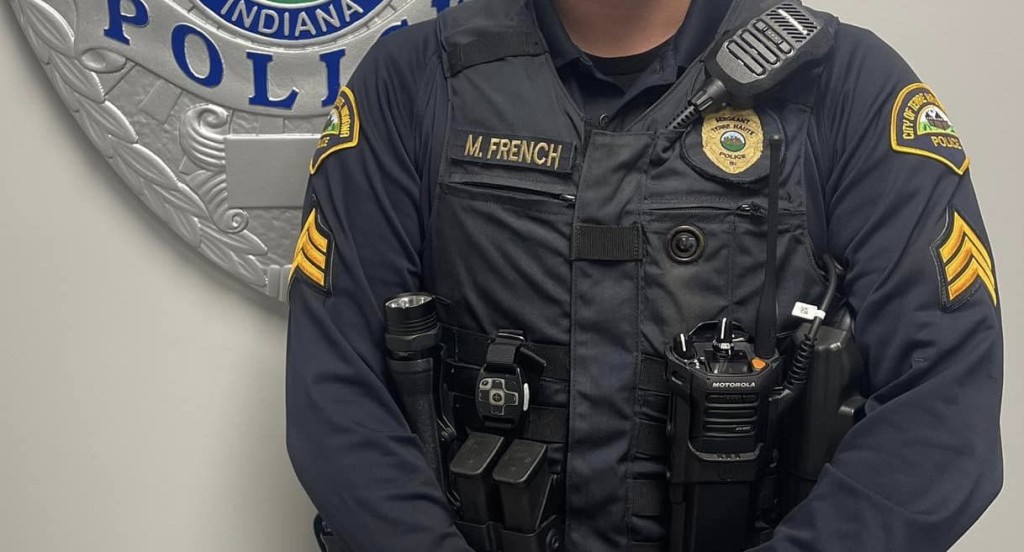
– Keri Yousif
Matt Larimer* addressed the Terre Haute City Council on Thursday, February 2, 2023, asking the city to reduce or eliminate the fee for body camera footage “from police officers involving uses of force.”
Mr. Larimer explained that under the current city policy, which charges $150 per video, an individual making a request for footage from three officers involved in the same incident would be required to pay $450.00 for the videos from the single incident.
He also stated that when someone’s mug shot circulates, via the press and/or social media, and the individual appears to have suffered injuries, rumors circulate speculating on what may or may not have happened during the incident.
“I think,” said Larimer, “that making this body cam footage more accessible will help to eliminate those rumors; it will help to keep police accountable, but it will also help police when they’ve done the right thing, and then it is shown that it’s the right thing.”
Currently Indianapolis charges $50 for a video under 30 minutes, $100 for a video from 30-60 minutes, and $150 for a video over 60 minutes. Under current state regulations, the maximum amount a city is allowed to charge for a body cam video is $150.
As Larimer notes, Terre Haute currently charges the maximum allowed for each video, regardless of length. Larimer asked that Terre Haute be a “leader in the state” by giving free access to body camera footage in incidents where there is a use of force, the goal being to provide accountability and to build trust in the community.
The City Attorney, Eddie Felling responded to Mr. Larimer’s request making several points, namely citing the number of videos and the time and labor involved in reviewing those videos before they can be released.
Felling stated that in 2022, there was a total of 413 incidents of use of force in Terre Haute, with a total of 728 officers involved in those 413 incidents. For each officer, there is the possibility of a body cam, a dash cam and/or an in-car or rear-view camera, all of which multiplies the number of possible videos per incident.
Mr. Felling went on to note that each video must be manually reviewed and possibly redacted before release so that no protected or confidential information is released, such as individual health information, license plate numbers, the inside of an individual’s home, or the presence of a minor.
He also cited an example in which one incident included three dash cam videos and one body cam video, totaling 11 hours and 40 minutes of video time, for which the city collected $450 for the video request.
Felling estimated, however, that the paralegal who reviewed and redacted the videos before release spent over 41 hours completing the work, costing the city $1,500.
He cited proposed Indiana House Bill 1142, which would revise the current limits on charges for body cam footage by allowing state and local agencies to include labor costs incurred to obscure non-disclosable information in the recording and perform an administrative review of the recording.
“I understand,” Mr. Felling concluded, “why someone would ask for this, but please keep in mind that we make these videos available, and what we charge is nothing compared to what we put into it.”
Councilperson Martha Crossen asked Mr. Felling how many requests for body camera footage the city typically receives. Felling did not have that information available but said he would provide the council with the requested information.
Councilperson Crossen noted that “One of the major reasons for us investing in body cams was to have this information available precisely for the reasons Mr. Larimer designated, which are to both protect the public and to protect the force, our police officers from false claims. . . . obviously, it’s a balance . . . but certainly, it’s worth reviewing.”
Terre Haute resident Ralph Leck also spoke to the issue, asking the city council to “take Mr. Larimer’s request seriously.” In Mr. Leck’s words: “Why do we have these videos if we can’t gain access to them?”
Mr. Leck noted that the number of incidents with use of force—cited as 413 incidents in 2022 by Mr. Felling—is a number that serves as an “economic barrier” to access body cam footage: a large number of incidents equals a large number of body cam videos, which results in a burden on the city to review and redact the videos, culminating with increased costs for the city.
But, Mr. Leck argued, the high number of incidents with use of force is also the very same reason why the public should have access to the body cam footage. As Mr. Leck concluded, “if it’s 400 [incidents with use of force], we’ve got a problem; we’ve got more than one a day.”
* Disclosure: Matt Larimer is an editor and writer for Vice News Terre Haute.
You can fact check this article and find out more at the sources listed below:
YouTube recording, Terre Haute City Council Meeting, 2/2/23: https://www.youtube.com/watch?v=j_Eb0fZDHNw
City of Terre Haute Office of Public Information: https://www.terrehaute.in.gov/departments/pd/office-of-public-information.html
State-regulated cost of body cam footage: see Indiana legislation, Second Regular Session of the 119th General Assembly, 2016, page 21, g1 “the agency’s direct cost of supplying the information in that form. However, the fee for a copy of a law enforcement recording may not exceed one hundred fifty dollars ($150).” https://iga.in.gov/legislative/2016/bills/house/1019#document-3df25085
Proposed House Bill 1142: https://iga.in.gov/legislative/2023/bills/house/1142

3 responses to “Citizen’s request free access to body-camera footage at city council.”
Show’em if ya got’em
yhaaawwoo
LikeLike
This is a bunch of bullshit
LikeLike
What you talkin’ ’bout a economic barrier? You sound like bayrock hussein obamy.
LikeLike